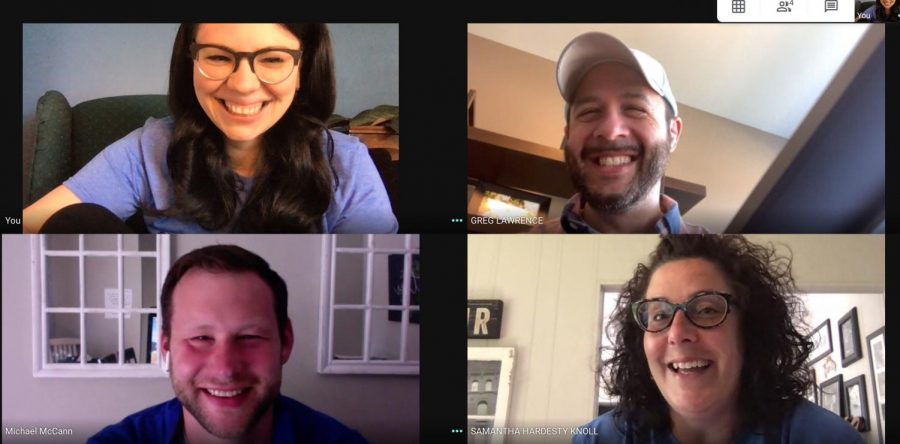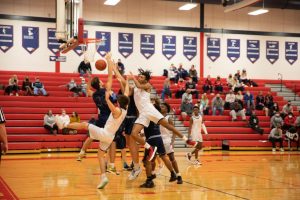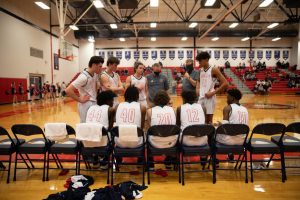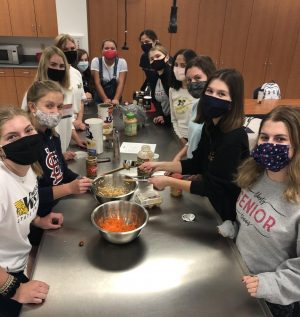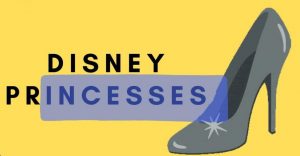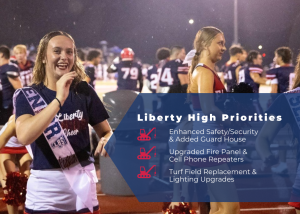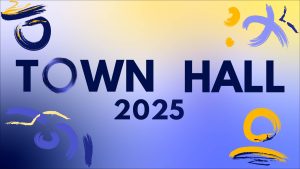Coaching Educators To Broaden Their Digital Perspective
The WSD Technology Department combines creativity and innovation for virtual learning
Director of Technology Greg Lawrence and Instructional Technology Coaches Amanda Moody, Samantha Hardesty Knoll, and Mike McCann, discuss plans for the 2020-2021 school year over a Google Meet.
January 3, 2021
For the technology team that’s 25 strong, the shift to Level 3: Virtual learning has been right up their alley. The WSD Tech department consists of technicians, network administrators, student data technicians and instructional technology coaches to aid educators and students alike in their day-to-day interactions with technology.
Director of Technology Greg Lawrence believes that virtual learning has positively impacted their department, providing them with an opportunity to do what they do best.
“We have an amazing team, who are extremely dedicated and passionate to ensure everyone is ready to learn. Switching to Level 3 has continued to demonstrate exactly that,” Mr. Lawrence said.
By instituting a Technology Help Desk, students and families are able to contact the department for tech support. Whether it’s how to use a device or repairing a Chromebook, they have increased the flexibility and the scale of their work this year. In fact, the department has distributed more than 14,000 Chromebooks to students for virtual and hybrid learning.
“While we are not new to Chromebooks in our students’ hands, they have allowed everyone to continue to be connected throughout the year,” Mr. Lawrence said. “Our help desk is busy from the start of the day to the end of the day.”
As the shift to virtual learning increased the interactions with technology for students, it has done the same for teachers. They can request one-on-one assistance with virtual learning tools through the WSD Tech Hub, providing a platform to call, online-chat, and ask for an in-person visit. The assistance for teachers has recently been concentrated in helping them navigate Canvas and Google Meet. Instructional Technology Coach Amanda Moody emphasizes the importance of being technologically apt in the education field—especially during a pandemic.
“As tech coaches, we want to be there for our teachers so that they feel confident using best practices when teaching virtually, in-person, or in a hybrid setting,” Mrs. Moody said. “This year my work feels more important than ever.” Each of the three instructional technology coaches is assigned to one high school: Sam Hardesty Knoll works with Liberty, Mike McCann with Holt, and Amanda Moody with Timberland and the Virtual Academy. Mrs. Knoll manages tools such as Google, WeVideo, and Canvas and works directly with teachers and students to implement these tools, a task she completes in a normal year and during the pandemic.
“What is different is that there is more urgency to what we do and more problem solving with teachers, students and family,” Mrs. Knoll said. The implementation of virtual learning tools has proved to be complex, requiring those in the department to diversify their ways of teaching as well as distributing hardware. For teachers and students, their approach to technology must change; more flexibility to online obstacles and an open mind to trying new tools are key to persevering through Level 3.
“There is so much more to virtual learning than just moving your lessons online. There is an art to it and pedagogy that aligns with it,” Mrs. Knoll said. “I am passionate about helping teachers to grow in this area so that lessons are engaging and meaningful for our students.”
Mrs. Moody shares similar sentiments regarding the relationship between in-person and online learning: both have a common goal of maximizing the ability to build relationships in the classroom.
“It’s not about the fancy new tools. It’s about designing online spaces that foster student engagement so that students are supported to learn,” Mrs. Moody said.
While Canvas and Google are conduits for education, the tech department believes there is a lesson to be taken away from the programs themselves.
“I am excited to take what we learn about virtual learning after the pandemic and use that knowledge to provide even more exciting and better learning experiences for our students,” Mr. Lawrence said. “The technology of Chromebooks, hotspots, Canvas, and Google Meet has proven that learning can take place anytime and anywhere. Knowing this has the potential to open many doors in the future.”


